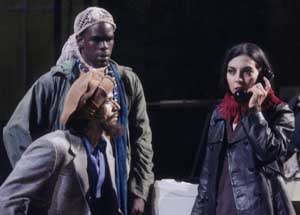-
- Constitutional Marriage Amendment reintroduced in Congress
- Supreme Court to hear Texas sodomy case this month
- Texas bans recognition of same-sex unions formed in other states
- Kentucky governor signs order protecting GLBT state employees
- Philadelphia Boy Scout council to stop discriminating against gays
- Presbyterians end convention without lifting ban on gay clergy
- Suspect in bombing of Atlanta gay bar captured
- National News Briefs
- World News Briefs
-
- An interview with the National Gay & Lesbian Task Force’s new executive director, Matt Foreman
- Democratic presidential candidates not pro-gay enough for NGLTF Policy Institute, says report
- Londoner takes title in 2003 International Mr. Leather competition
- GLBT leaders meet to decide whether a ‘gay agenda’ really exists
Arts & Entertainment
Globe’s ‘Pentecost’ is political theatre at its best
Published Thursday, 05-Jun-2003 in issue 806
In David Edgar’s Pentecost, playing at the Old Globe Theatre, a fresco is held hostage. With the siege of this ancient church fresco — one that bears a resemblance to Giotto’s Lamentation Over Jesus — an overly rich dialog about political, economic and artistic walls ensues, capturing the audience as well.
A local curator from an unnamed Balkan country, Pecs (Mariana Dimitrova) solicits the aid of an art historian, Davenport (Michael Santo) to preserve an artwork that has the capacity to redefine Western art history. From this simple premise, playwright Edgar challenges his audience to look at world communication, the politics of stateless nations and the differences among the people of all nations.
Pentecost is political theatre in the best sense, offering an inspiring set design, international music and dance, and a strong ensemble of polished actors.
As the biblical title of the play suggests, (Pentecost celebrates a time when the Holy Spirit descended from heaven and gave the Apostles the ability to speak in tongues), the play explores the difficulty in communication in a world of disparate languages.
The 31 characters in the play, representing a myriad of political and religious factions, speak eight different languages, but manage to communicate as if they, too, had the ability to speak in tongues.
Still this isn’t an easy play for the listener. The opening scene between Pecs and Davenport, for example, found the audience straining to understand the “mostly English” dialog accented by other world languages. On too many occasions, the dialog was lost because of the rapidity of delivery or poor projection on the part of the actor. Genesis’ biblical story of The Tower of Babel certainly plays a secondary role within the play.
The recent participation by the United States in the overthrow of Saddam Hussein’s government in Iraq could have been a scene in Edgar’s play, so timely is the message from his 1994 premiere. The author reaches out in an attempt to awaken and enlighten the global community by bringing attention to the many political atrocities of the past, as well as the present.
The development of the play focuses on the fresco. The stake of each separate faction (religious, political, social, personal belief) is voiced in relationship to the ownership of the painting. For example, Pecs simply believes that the fresco would foster recognition of her country by the art world, especially the Western world.
Although the first act was a bit tedious, the second act allowed for more action and dramatic possibilities as religious, political and asylum-seeking groups descended upon the church to lay claim to the painting for their own particular agendas. In the end, the political agenda — as it played out all too recently in Iraq — may take precedence over the preservation of historical art treasures or sacred beliefs.
The three-hour length of this powerful and provocative play might have benefited from a few cuts in the script that would have left the production a bit trimmer, the theme still intact, and the audience less exhausted, mentally and physically.
Universal truths, however, ring out in the play. Worth repeating from the text is the line, “We are the sum of all the people who have invaded us.”
Pentecost plays at the Old Globe Theatre through July 5, 2003. Call (619) 231-1941 for more information.
|
|
Copyright © 2003-2025 Uptown Publications


